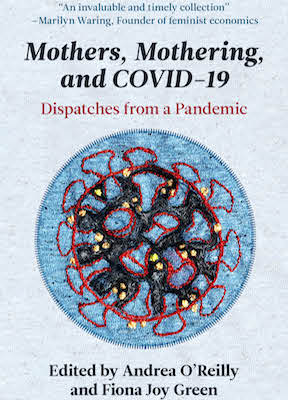The COVID-19 pandemic has impacted many groups of people, but maybe none more than mothers.
After becoming frustrated with the lack of recognition of mothers being frontline workers, University of Winnipeg Professor Dr. Fiona Green, Department of Women’s and Gender Studies, and Dr. Andrea O’Reilly, York University, put out a call for creative art, poetry, photography, writing, and scholarly research from mothers around the world.
There’s a real call for policy work and addressing the real issues around motherhood and the labour that is unacknowledged
Dr. Fiona Green
What came together by the end of 2020 was Mothers, Mothering, and COVID-19: Dispatches from a Pandemic. The 45-chapter Demeter Press collection explores the impact of the pandemic on mothers’ care and wage labour in the context of employment, schooling, communities, families, and the relationships of parents and children.
“Throughout the pandemic, there has been little mainstream media coverage, public policy, or social research on how families are managing under social isolation and pandemic protocols,” said Green and O’Reilly. “Few have acknowledged, let alone sought to support, the crucial work mothers are doing as frontline workers to keep families functioning in these times of increasing uncertainty.”
Sharing pandemic experiences
This unique collection, which features 70 contributors, is split up into three sections: Mothers and Wage Labour, Mothers and Carework, and Maternal Health and Wellbeing.
Chapters cover a wide range of topics, including: the history of Australian mothers during the 1918 and 2020 pandemics; thoughts on gender, race, and class; experiences of mothers living with a multigenerational family in one house; preparing and experiencing birth during a pandemic; and much more.
UWinnipeg faculty members Dr. Jaime Cidro, Dr. Mary Jane Logan McCallum, and Dr. Lorena Fontaine co-authored the chapter Everyday Stories on Extraordinary Times: History, Relationality and Indigenous Women’s Experiences during the COVID-19 Pandemic.
“The pieces by Black mothers and Indigenous mothers are powerful, as are those by mothers dealing with disabilities of their own or of their children,” Green said.
When a call for submissions was put out last spring, Green and O’Reilly received more than 100 responses from scholars in Brazil, India, Mexico, Canada, the United States, Australia, and other countries.
Because they had far more submissions than could be included in the book and they saw that there were a substantial number addressing the experiences of mothering within the academy, they decided to also create a double issue Academic Motherhood and Covid-19 of the Journal of Motherhood Initiative for Research and Community Involvement, which was released online in December.
“Andrea, myself, and Dr. Olga Sanmiguel-Valderrama (University of Cincinnati) ended up editing the entire thing together,” Green said of the process. “Pieces would come in, we’d read them, and then send them back with comments.”
While there are many powerful pieces throughout the Mothers, Mothering, and COVID-19 collection, one that stands out for Green is Euphemia Bonnitcha’s Planet COVID-19: Single Mothering and Disability.
The author describes the chapter as “mothering from the perspective of a feminist, lesbian, autistic, single, white, Australian, and middle-class mother” working full-time and highlighting the steady increase in panic she felt as “my autistic daughter fell into a chasm.”
“This last section of the book is about what’s happening to mothers in terms of their mental health and wellbeing, as well as what they’re doing for family members,” Green explained. “There’re very strong pieces in this section, including mothers dealing with the mental health of their children.”
Calling for change
Besides being able to share these experiences and voices widely, Green hopes this collection will spur action towards real change.
“There’s a real call for policy work and addressing the real issues around motherhood and the labour that is unacknowledged,” she said. “I think there’s an element of optimism and hope because most people have lived through a year of COVID-19, they are understanding that people are suffering, and hopefully there’s more compassion for everyone’s situation.”
Mothers, Mothering, and COVID-19: Dispatches from a Pandemic will be available March 5.


